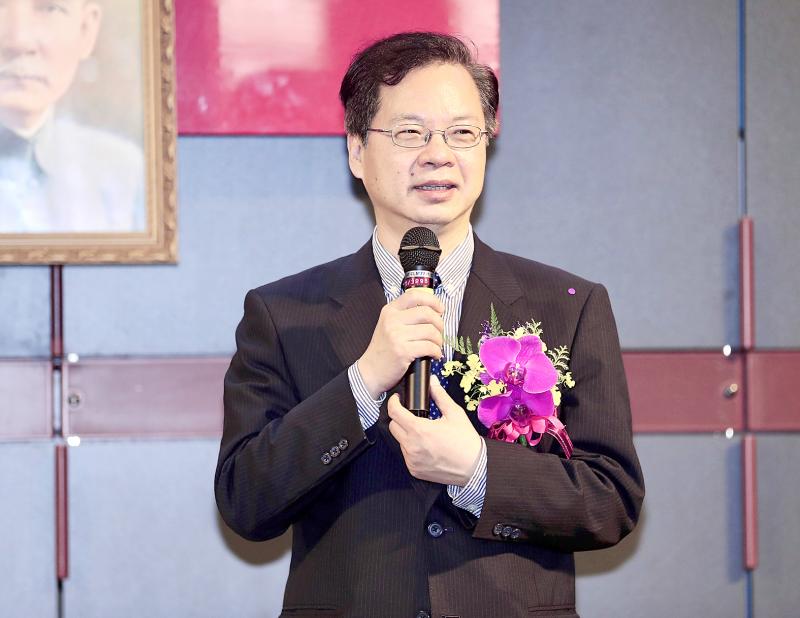The National Development Council (NDC) is to draw up a road map to guide the nation’s search for a new growth engine in the next four years based on technology, green energy and other core strategic industries, new NDC Minister Kung Ming-hsin (龔明鑫) said yesterday.
The world would see continued US-China trade tensions and supply chain realignment characterized by less concern over production costs and more for risk control and the assurance of critical technology and materials, Kung said.
“The shifting trends pose both challenges and opportunities, and Taiwan should carve out a niche position on the global stage,” Kung said.

Photo: CNA
Taiwan’s information technology sector commands global leadership, enabling the nation to emerge unscathed from a US-China trade war and remain resilient amid the ongoing COVID-19 pandemic, he said.
The nation’s economy would grow by more than 1 percent this year, while major trading partners suffer contractions induced by lockdown measures to contain the novel coronavirus, he added.
Local tech firms have benefited from a surge in demand for laptops, tablets and devices used in teleworking and distance learning, which has helped offset a decline in smartphone sales, Kung said.
Technology is to gain more importance in the post-pandemic era, when Taiwan can seize on growing demand for 5G, artificial intelligence and the Internet of Things, he said.
The future technology supply chain would assign more weight to the pursuit of quality instead of quantity, which contributed to the rise of China and ASEAN states as the world’s factories, Kung said.
The council would press ahead with efforts to build Taiwan into the “Asian Silicon Valley,” he said.
In the meantime, the government is to deepen the development of renewable energy sources, particularly offshore wind farms that would grow into another trillion-dollar business and create well-paid jobs for young people, Kung said.
Wind farms last for only two decades, creating a need for new workers for decades to come, he said.
The council would also create a list of critical technologies and materials, and make sure that the government builds up a healthy supply for national security, Kung said, citing face masks and related materials as examples.
The government would assume a more active role in the nation’s economic development, as seen in a so-called national team for the production of masks, stabilization of the local bourse and financial relief efforts amid the pandemic, Kung said, adding that the change is consistent with the global trend toward deglobalization.
The council would wrap up the road map as soon as possible, he said.

Nissan Motor Co has agreed to sell its global headquarters in Yokohama for ¥97 billion (US$630 million) to a group sponsored by Taiwanese autoparts maker Minth Group (敏實集團), as the struggling automaker seeks to shore up its financial position. The acquisition is led by a special purchase company managed by KJR Management Ltd, a Japanese real-estate unit of private equity giant KKR & Co, people familiar with the matter said. KJR said it would act as asset manager together with Mizuho Real Estate Management Co. Nissan is undergoing a broad cost-cutting campaign by eliminating jobs and shuttering plants as it grapples

TEMPORARY TRUCE: China has made concessions to ease rare earth trade controls, among others, while Washington holds fire on a 100% tariff on all Chinese goods China is effectively suspending implementation of additional export controls on rare earth metals and terminating investigations targeting US companies in the semiconductor supply chain, the White House announced. The White House on Saturday issued a fact sheet outlining some details of the trade pact agreed to earlier in the week by US President Donald Trump and Chinese President Xi Jinping (習近平) that aimed to ease tensions between the world’s two largest economies. Under the deal, China is to issue general licenses valid for exports of rare earths, gallium, germanium, antimony and graphite “for the benefit of US end users and their suppliers

Dutch chipmaker Nexperia BV’s China unit yesterday said that it had established sufficient inventories of finished goods and works-in-progress, and that its supply chain remained secure and stable after its parent halted wafer supplies. The Dutch company suspended supplies of wafers to its Chinese assembly plant a week ago, calling it “a direct consequence of the local management’s recent failure to comply with the agreed contractual payment terms,” Reuters reported on Friday last week. Its China unit called Nexperia’s suspension “unilateral” and “extremely irresponsible,” adding that the Dutch parent’s claim about contractual payment was “misleading and highly deceptive,” according to a statement

The Chinese government has issued guidance requiring new data center projects that have received any state funds to only use domestically made artificial intelligence (AI) chips, two sources familiar with the matter told Reuters. In recent weeks, Chinese regulatory authorities have ordered such data centers that are less than 30 percent complete to remove all installed foreign chips, or cancel plans to purchase them, while projects in a more advanced stage would be decided on a case-by-case basis, the sources said. The move could represent one of China’s most aggressive steps yet to eliminate foreign technology from its critical infrastructure amid a